Partnering with Police: Rehab’s Role Critical as NC State Helps Nitro Get His Groove Back
The Cary Police dog’s journey since knee surgery in December has had several setbacks, showing how rehabilitation is a roll-with-it and pivot practice at the NC State College of Veterinary Medicine.
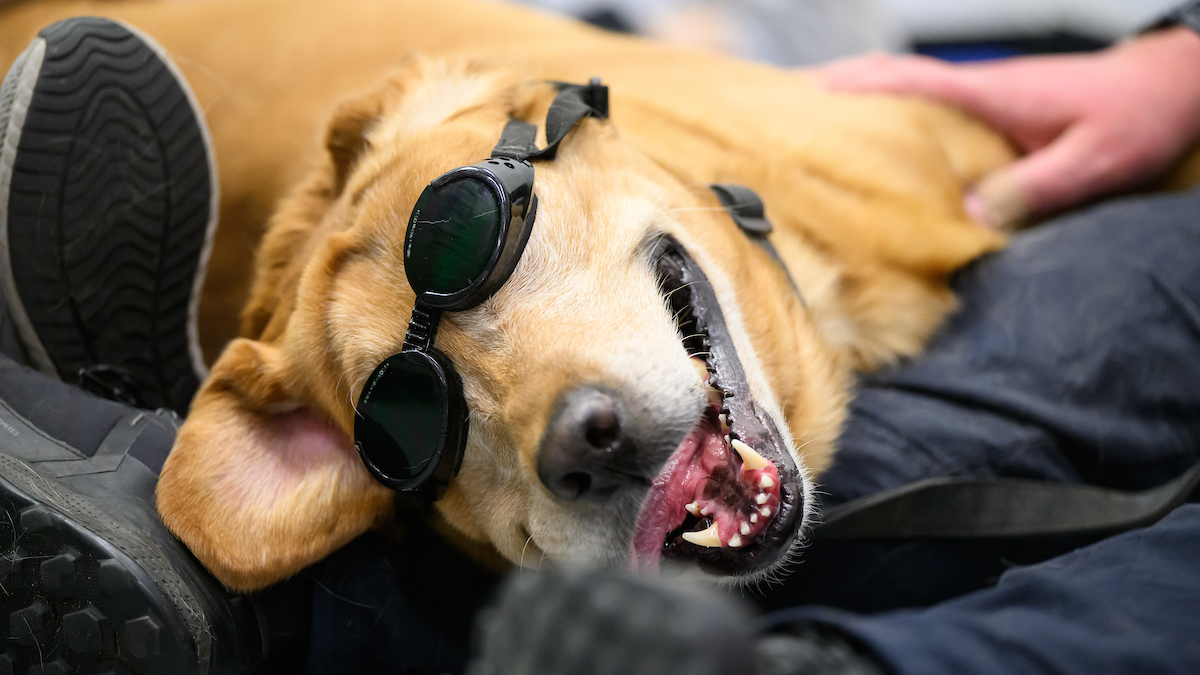
Before Nitro the Cary Police dog messed up his knee, his nose was the body part getting all the attention.
For years, the golden retriever-yellow Labrador mix used the black nub on his sweet face to track missing children and adults and to locate hidden explosives and firearms for the town of more than 175,000 residents just west of the NC State College of Veterinary Medicine in Raleigh.
A misstep on a stormy December night likely led to the torn knee ligament that has sidelined Nitro, first for surgery and recovery and now for rehabilitation at NC State.
Fortunately for Nitro, the College of Veterinary Medicine is home to Dr. Carmella Britt, the only veterinarian in the area who is board-certified in canine sports medicine and rehabilitation. Since January, Britt has been helping Nitro recover from what turned out to be several post-surgery complications that ultimately prompted the police to send the friendly furball into a much-deserved retirement at his handler’s loving home.
“Nitro’s a big ol’ goof head who weighs almost 90 pounds and thinks he’s 30 pounds,” said K9 Officer Matthew Berl, a 10-year veteran of the Cary Police Department and Nitro’s handler. “I always describe him as Air Bud, the friendly dog from the sports movie series. He’s a non-apprehension dog. He tracked for missing kids, people with cognitive disabilities, Alzheimer’s, and we didn’t want to scare them, so we had Nitro’s friendly face.”
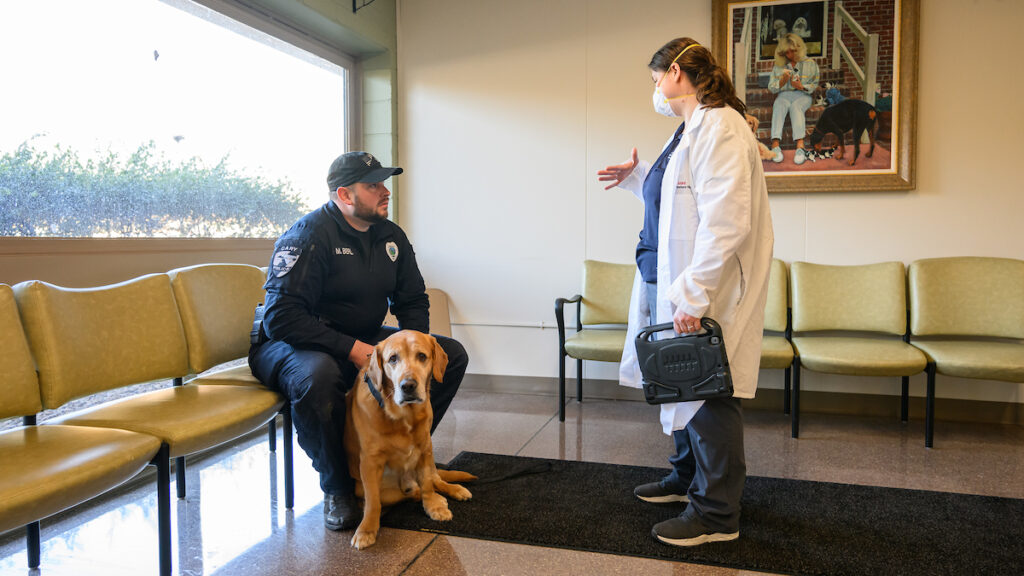
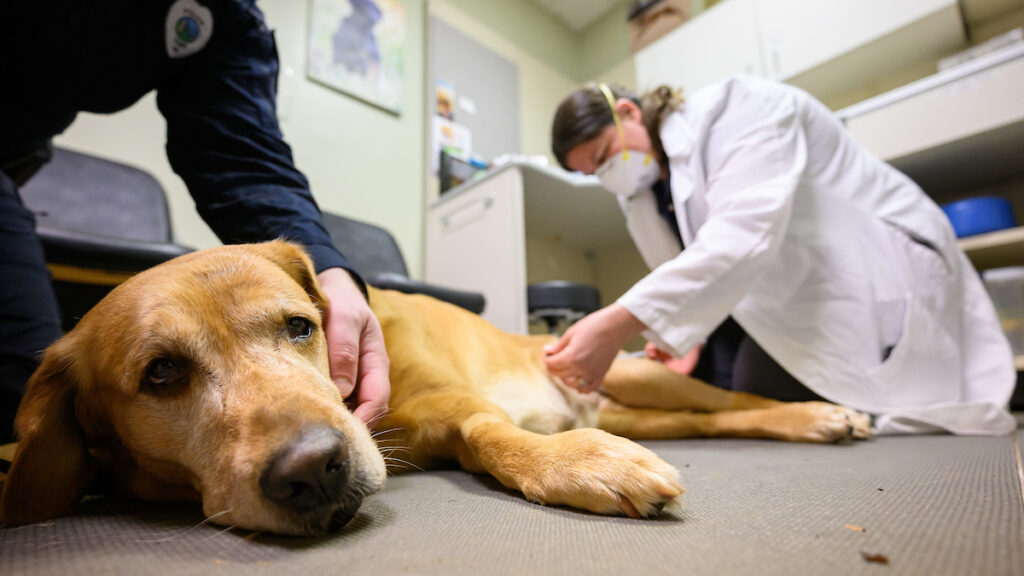
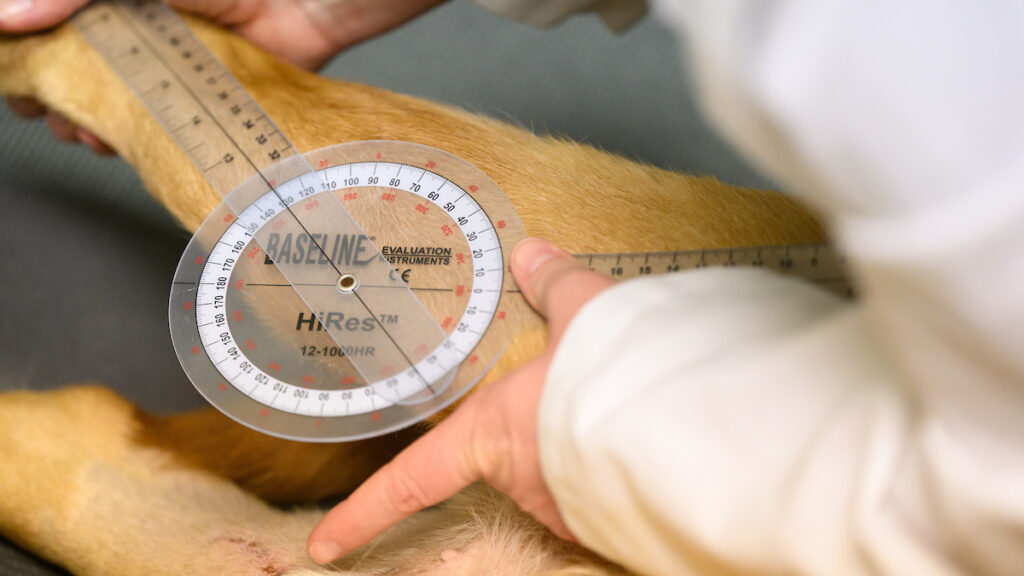
When Berl noticed Nitro limping in December, his local veterinarian’s office diagnosed a torn knee ligament. A mobile surgeon performed the dog’s knee surgery, called a tibial plateau leveling osteotomy or TPLO, which involves cutting the shin bone, rotating it and stabilizing it with a plate and screws.
At his initial rehab consultation with Britt in January, Nitro unexpectedly was not bearing weight on his injured leg weeks after his surgery. A subsequent X-ray revealed his fibula had fractured, a common post-TPLO complication. Britt prescribed pain medication and devised a patient-centered rehabilitation plan to ease Nitro back to peak condition as his fibula healed.
“As rehab specialists, we don’t just treat the one thing that they’ve come in to tell us is a problem,” said Britt, an enthusiastic advocate for the growing field of veterinary rehabilitation. “We really focus on treating the whole patient. We actually have a lot of cross-training with other specialties during our residency training. We have to do rotations with internal medicine, surgery and neurology. And we’re looking at the animal’s entire body conditioning, not just around the injury.”
And then … an infection
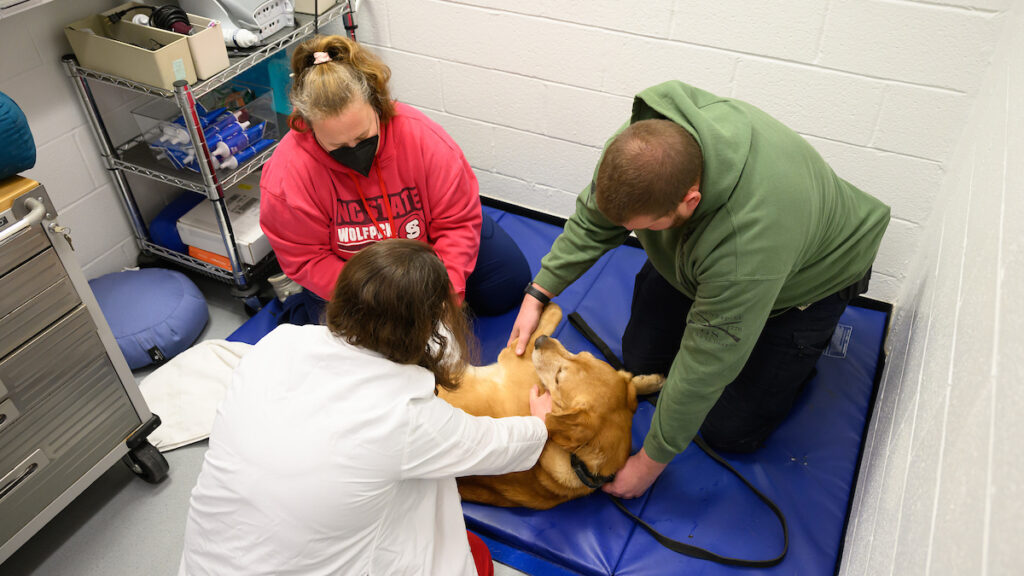
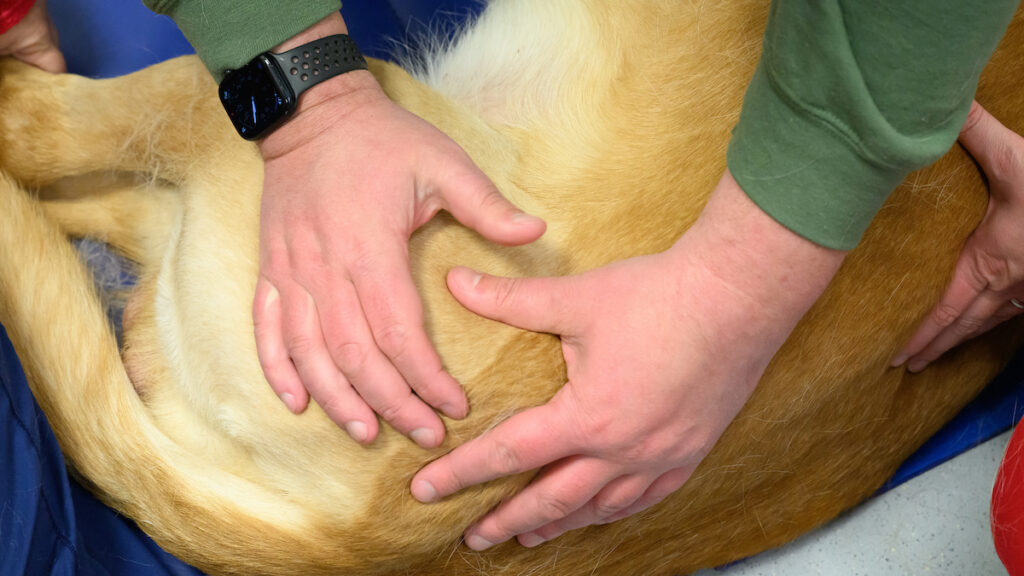
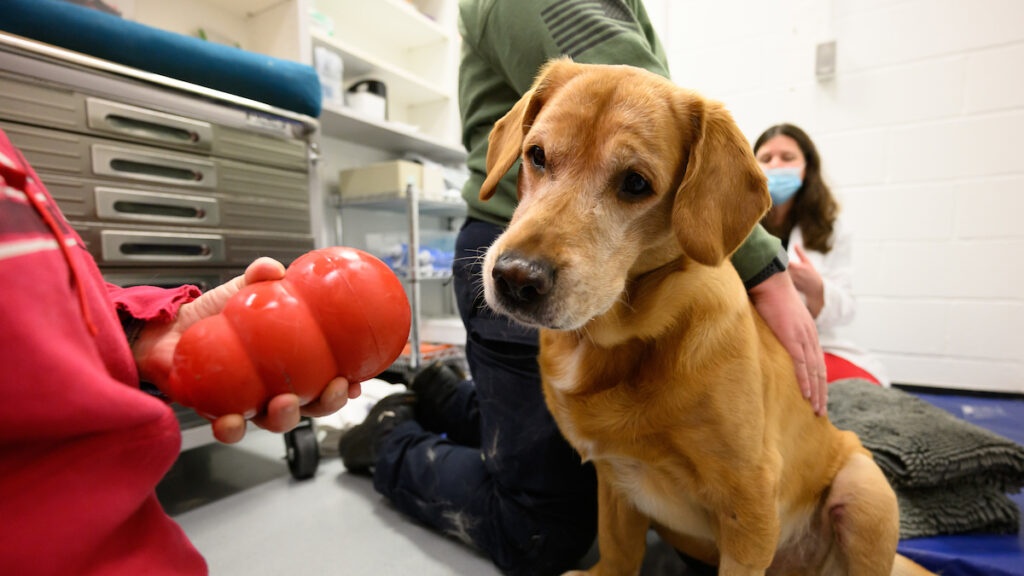
Nitro’s first appointment with Britt involved ice packs and laser therapy, performed by certified rehabilitation practitioner Heather Hopkinson, to treat the dog’s pain. The prolonged hobbling because of the broken fibula had caused Nitro to overuse the rest of his limbs and muscles to compensate for his lame leg.
Britt and Hopkinson demonstrated massage techniques for Berl to use with Nitro at home.
“Would you like a chance to do the massage in front of us?” Britt asked.
Hopkinson demonstrated, thumb over thumb, and then Berl took over.
“See how he relaxed?” Hopkinson said.
“It shows you’re doing it right,” Britt said, then added with a laugh, “I don’t know if he’s going to want to ever go back to work.”
Britt told Berl that she would need to see Nitro twice a week for a month and then likely once a week through March to get him back to work-level fitness.
“He could be happy to sit on the couch with the officer’s two daughters and watch TV and get snacks for the rest of his life,” Britt said at the appointment. “But because he’s going to go back to work, we have to do a conditioning component. I think that is probably globally true, not just for Nitro but for all of our sporting, working dogs. How do we make sure that we’re cross-training these dogs to ensure that they can prevent injury? Long-term fitness is huge for these guys.”
A few weeks into recovery, however, Nitro developed an infection under the plate in his knee that added weeks to the rehabilitation plan.
Berl told Britt that the Cary Police Department had decided to start training a new dog to replace Nitro but that he would continue his therapy to get back to good health for his new life as a pet pampered by Berl’s young daughters.
“They love him,” said Berl about Darcy, 7, and Erin, 5. “When I got Nitro, they were 2 and almost 4, and he let them tug on him and throw the ball for him. It helped with his training because, I presume, he had zero interaction with kids before the department got him. He learned real quick that if he can keep up with two toddlers, he can cope with anything.”
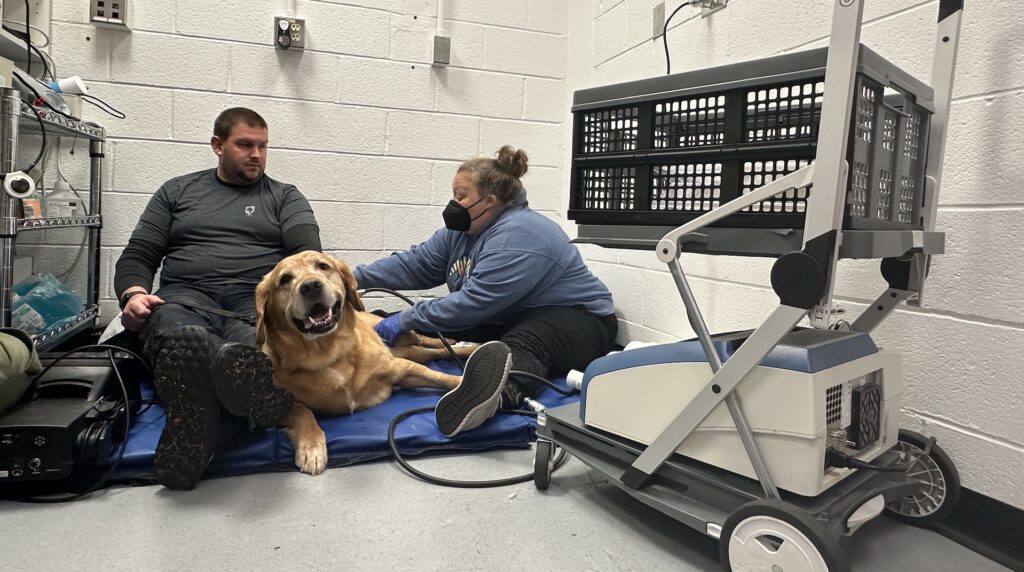
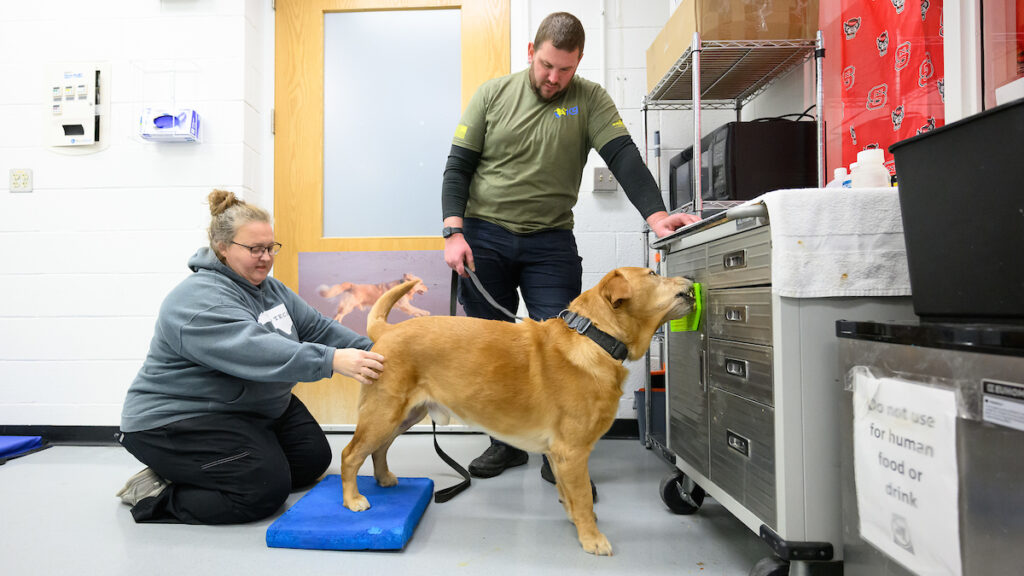
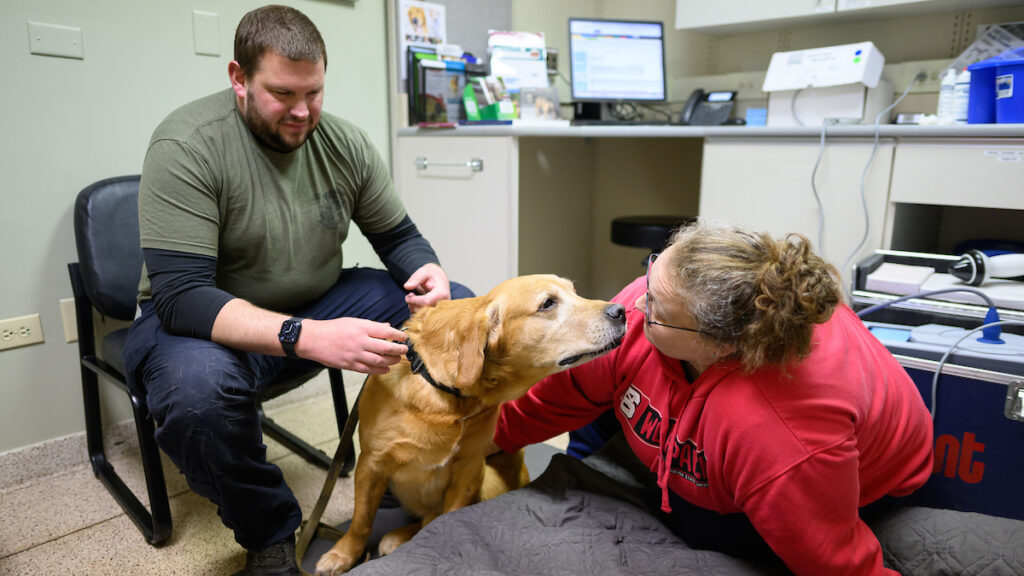
Nitro’s rehab will include incline and decline ramps, balance beams and a water treadmill. Britt said a rehab plan involves setting goals and quickly pivoting if things aren’t working.
“As a veterinarian, if I were dealing with a person, I can say, ‘Make sure you’re contracting that quadricep while you’re doing this exercise’ or ‘I want you to really focus on this one muscle group,’ ” Britt said. “That’s very challenging in dogs. I can’t say, ‘Hey, Nitro, can you please make sure you’re contracting your quads while we do this exercise?’ So we have to be very creative in how we get them to do that.”
‘As good as it gets’
Until the Cary Police Department recently acquired a bloodhound, Nitro was the only “missing person critical” tracking dog among the agency’s seven K9 officers, Berl said. The dog replacing Nitro professionally, a Dutch shepherd that Berl’s daughters have named Hank, will be a patrol dog once Berl has finished training him at his home outside Cary.
Berl said Nitro was very good at his job and recounted a story about a teenager who had ingested a lethal dosage of prescription medicine and fled into the woods. The fire department responded and found him at a park, but he ran into the woods again.
‘We were called in for the track, and Nitro led us straight to the kid who was unconscious in the woods,” Berl said. “The fire department gave him several doses of Narcan to bring him back. If we hadn’t found him, he would have died in the next 30 minutes.”
That’s exactly why Berl said he loves his job so much.
“Any canine handler is going to tell you it’s cool to sweep facilities and make sure it’s safe for everyone else or looking for narcotics,” Berl said. “But finding people who don’t want to be found, that’s as good as it gets in this world.”
For her part, Britt has worked before with police departments to rehab injured canine officers. While completing her three-year residency in rehabilitation at the Animal Medical Center in Manhattan, she worked with the New York City Police Department’s dogs.
“There is something really special about knowing that these dogs protect us and do work that keeps us safe,” Britt said. “One of the reasons I got into veterinary medicine is because I really love people, and I love that people-animal bond that is just so profound. To be someone to support that bond between a police dog and his handler is just an honor and a privilege.”
As Berl begins to put Hank through his police dog paces, he is somewhat sad that Nitro’s workdays are over. At the dog’s continuing rehabilitation appointments at NC State, Berl is always there, stroking a paw or an ear as Britt and Hopkinson work on returning Nitro to health. Heading into March now, he’s doing great.
“He’s going to have a good retirement,” Berl said. “Sometimes we wait too late to retire a dog, and they don’t get the full enjoyment of being a dog. I’m looking forward to him getting to be just a dog for the first time in his life. No stress, no worries, no work.”
Nitro’s nose may no longer seek out the lost, but he’ll likely find that nuzzling giggling girls for the rest of his life isn’t a bad tradeoff.
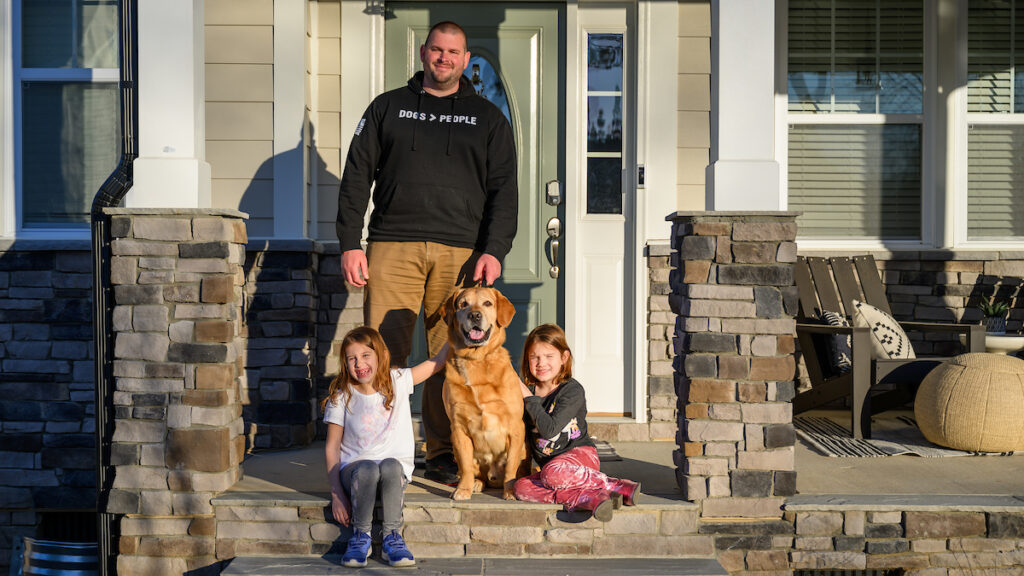
- Categories:


